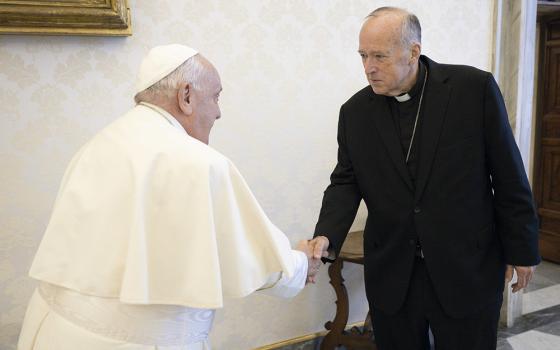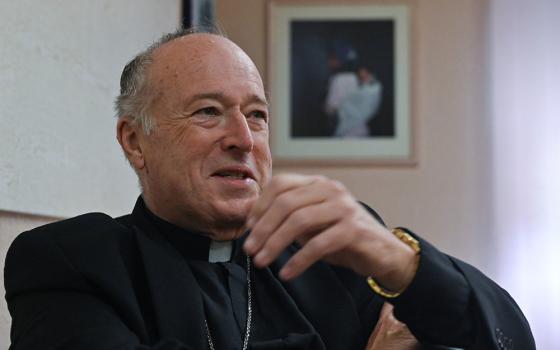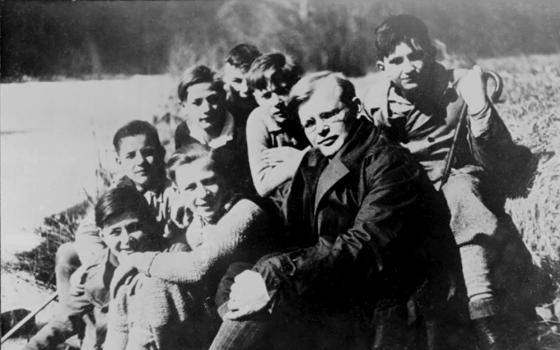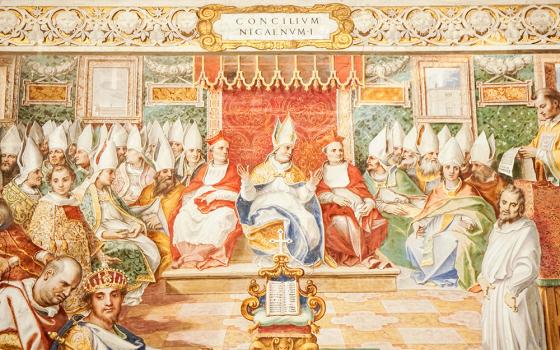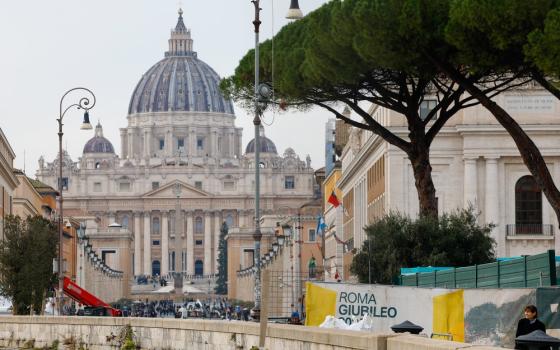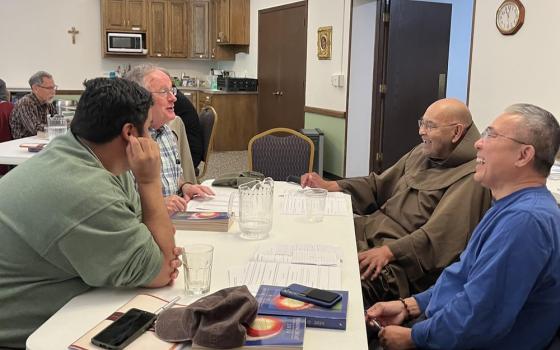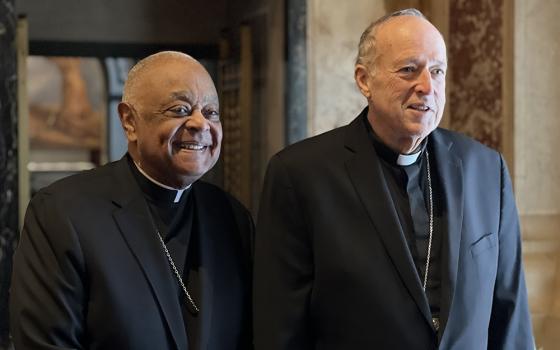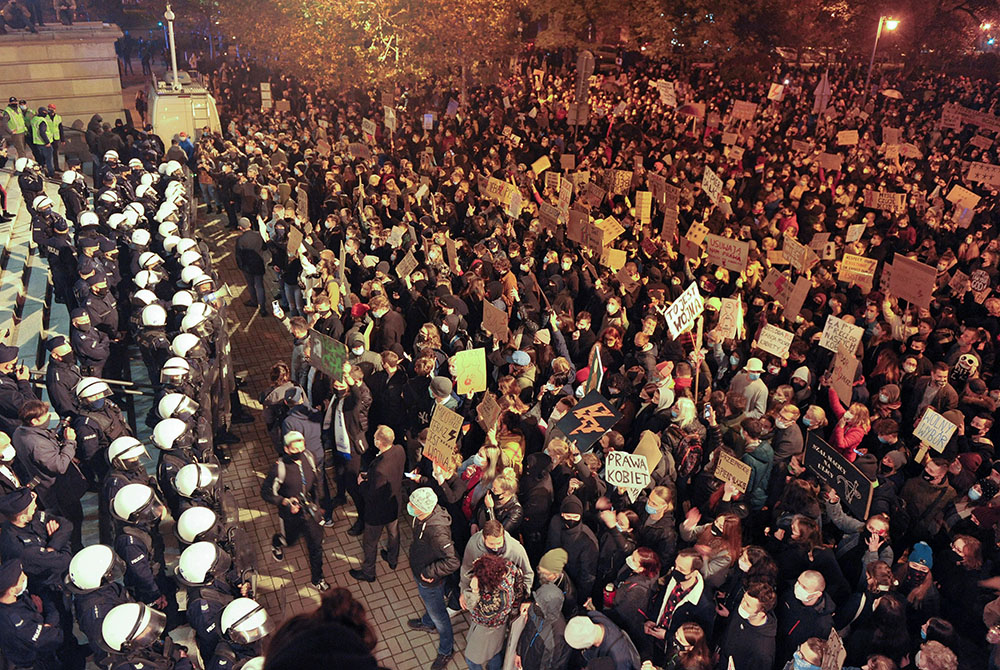
Demonstrators protest Oct. 25, 2020, in front of the Cathedral of Christ the King in Katowice, Poland, against the ruling by Poland's Constitutional Tribunal that imposes a near-total ban on abortion. Many young Polish women protested in November against the church-backed government proposal to further restrict abortions. (CNS/Agencja Gazeta via Reuters/Anna Lewanska)
It was a gloomy forecast for the Polish Catholic Church.
"I say it's a dark night for the church," said Zbigniew Nosowski, one of Poland’s prominent intellectuals. "It is a difficult time of crisis."
Nosowski, a sociologist and journalist, is editor-in-chief of Wiez (Bond), a scholarly quarterly. Speaking in a phone interview, he said that there is widespread dissatisfaction with the hierarchy of the church and its unwavering embrace of the right-wing authoritarian ruling party, Law and Justice, led by Jaroslaw Kaczynski.
The church played a crucial role in the transition from communism to democracy, said Dariusz Stola, professor of history at the Institute for Political Studies of the Polish Academy of Sciences. As a result, the church became enmeshed in the nation’s political affairs.
"In the last 20 years, we have seen an alliance between the church and the populist right, and this has alienated Poles inside and outside the church," said Stola. "And now the church will pay for this questionable alliance."
Poles who are in their 40s and 50s are not feeling a loss of faith, but rather a deep loss of identity with the church as an institution, said Nosowski. The church is also losing support from young people who are becoming increasingly secularized.
"The church is a very conservative, antiquated institution that is heavily involved in politics and tries to impose its views on all the people and turn them against each other, dividing them into good and bad," said a 27-year-old student, Agnieszka.
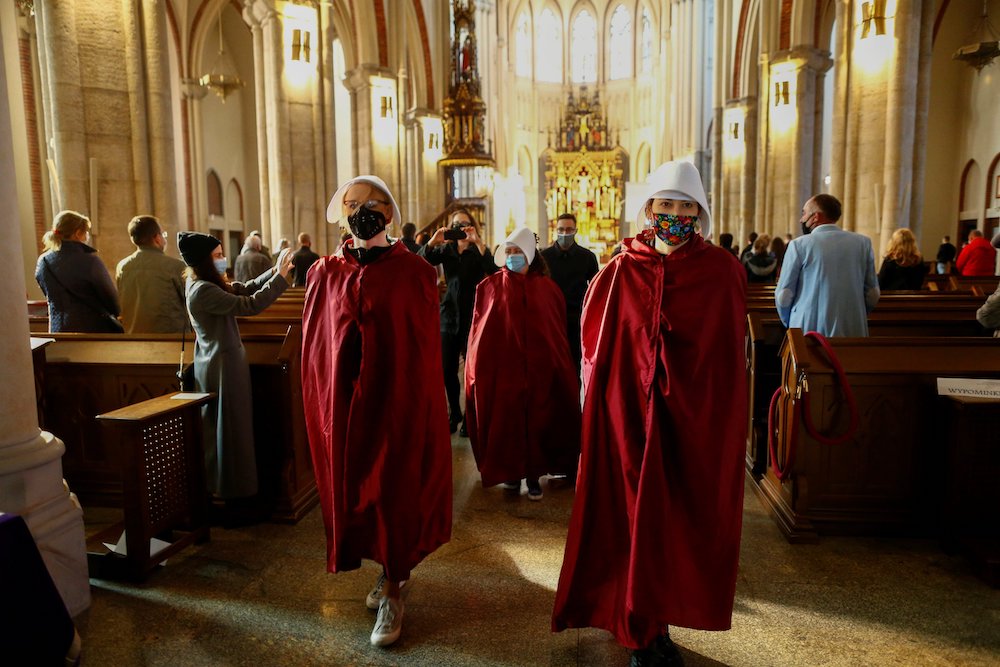
Demonstrators protest Oct. 25 in the Archcathedral Basilica of St. Stanislaus Kostka in Lodz, Poland, against the ruling by Poland's Constitutional Tribunal that imposes a near-total abortion ban. (CNS/Agencja Gazeta via Reuters/Marcin Stepien)
The student, who asked that her last name not be used for fear of recrimination for participating in the protests, exemplifies the thinking of many young Polish women who protested in November against the church-backed government proposal to further restrict abortions.
The LGBTQ community is another target for church attacks. Paulina Gorska, an assistant professor of psychology at Warsaw University, said that last month Krakow Archbishop Marek Jedraszewski had warned that "a rainbow plague" is enveloping Europe like a rapidly spreading virus.
"Feminists, gays, lesbians and … trans people have become the national enemy No. 1, an essential target for autocratic and totalitarian regimes throughout the world," said Maciej Czajkowski, a Warsaw-based Polish television producer who formerly worked for the BBC in London.
Czajkowski, who is gay, said that the far right sees people like him as a disease that threatens traditional Polish values. "They want us to go home," he said. "Where is my home? I thought it was here in Poland."
Demonstrators hold a giant rainbow flag during a protest against hatred toward LGBT people Aug. 30, 2020, in Warsaw, Poland. (CNS/Kuba Atys, Agencja Gazeta via Reuters)
Sexual abuse by priests is also causing Poles to feel alienated from the church, as the documentary "Tell No One" illustrates. It is the story of an adult woman who tracks down an elderly priest who started abusing her when she was 7 years old. She asks the simple question: Why?
The documentary has had more than 24 million viewers on YouTube.
According to findings by IBRiS, one of the largest polling institutes in Poland, the level of trust for the church plunged from 58% of Polish Catholics in September 2016 to 40% this past November, while the level of distrust jumped from 24% to 42%.
Adding to this Polish alienation from the church was the Nov. 10 publication of a Vatican report that found Pope John Paul II had appointed ex-cardinal Theodore McCarrick as Archbishop of Washington in 2000 despite warnings about McCarrick's sexual harassment of seminarians from a prominent U.S. cardinal.
The 449-page McCarrick report, which tarnishes the papacy and calls into question John Paul II's sainthood, has dealt a severe blow to a Catholic country that took great national pride in its Polish pope. His visits to towns and cities in Poland throughout his 27-year papacy drew large crowds.
New U.S. Cardinal Theodore E. McCarrick kisses Pope John Paul II after he received the red biretta during a consistory ceremony in St. Peter's Square at the Vatican Feb. 21, 2001. (CNS/Reuters/Vincenzo Pinto)
Stanislaw Obirek, a professor at the American Studies Center of the University of Warsaw, said the McCarrick report is having a polarizing effect on the Polish church. He said in an email that that Polish bishops and right-wing journalists regard the report as an attack on the "eternal holiness of the Pope."
Obirek, who left the priesthood in 2005 after serving as a Jesuit priest for nine years, takes an opposing view. He sides with liberals who view the case as an example of the necessity to depart from the cult of individuality centered on the Polish pope that’s been practiced by the Polish clergy.
"It is an extremely well-documented history of the cover-up of pedophilia in the church in which John Paul II was actively involved since 1985," he said of the report.
Obirek said that Cardinal Stanislaw Dziwisz, who served as papal secretary to John Paul, was the main architect of the alliance between the church and Poland’s ruling Law and Justice party. He claims that Dziwisz has an authoritarian side that is sympathetic to the government and has been instrumental in undermining democracy.
Advertisement
In a statement on behalf of the Polish bishops, Archbishop Stanislaw Gadecki defended the papacy of John Paul II, and praised the pope's role in hastening the collapse of communism and preserving the nation’s faith and values.
Some 1,500 Polish academics last week signed a statement saying that, while Pope John Paul showed poor judgment in ignoring the reported sexual abuse, this did not make him guilty.
Fr. John Pawlikowski, a retired social ethics professor at the Catholic Theological Union in Chicago, denounced this downplaying of John Paul's lack of action against McCarrick.
"This was a major failing by Pope John Paul II, and it had significant impact on the credibility of the church and raised questions about the whole operation of the Vatican," Pawlikowski said.
[Donald Snyder is a freelance writer who worked at NBC for 27 years as a news producer. He retired from the network in 2003.]
